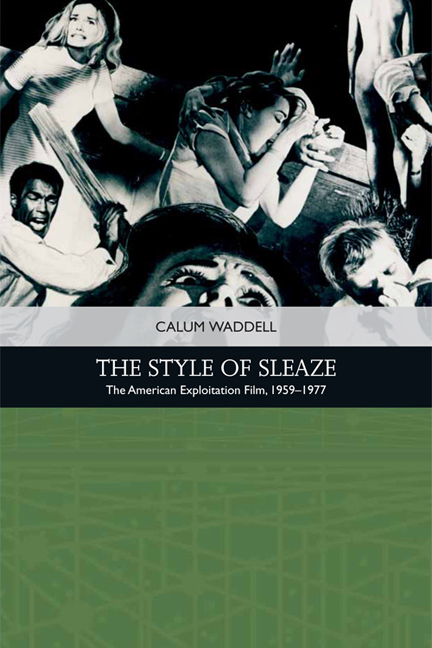Book contents
- Frontmatter
- Contents
- List of Figures
- Acknowledgements
- Introduction
- 1 Not Quite Hollywood
- 2 Emerging from Another Era – Narrative and Style in Modern Exploitation Cinema
- 3 Can We Call It Sexploitation?
- 4 Sex Morality Plays: Character in Adult Cinema
- 5 The Body is Everything: Sexploitation Spectacle
- 6 Exploitation-Horror Cinema
- 7 Cannibalising Tradition: Romero’s Zombies and a Blood Feast
- 8 Slash and Burn: The Exploitation-Horror Film in Transition
- 9 Blaxploitation Cinema: Race and Rebellion
- 10 Sex, Violence and Urban Escape: Blaxploitation Tropes and Tales
- 11 The Blaxploitation Female
- 12 Exploitation as a Movement
- Select Bibliography
- Index
4 - Sex Morality Plays: Character in Adult Cinema
Published online by Cambridge University Press: 11 November 2020
- Frontmatter
- Contents
- List of Figures
- Acknowledgements
- Introduction
- 1 Not Quite Hollywood
- 2 Emerging from Another Era – Narrative and Style in Modern Exploitation Cinema
- 3 Can We Call It Sexploitation?
- 4 Sex Morality Plays: Character in Adult Cinema
- 5 The Body is Everything: Sexploitation Spectacle
- 6 Exploitation-Horror Cinema
- 7 Cannibalising Tradition: Romero’s Zombies and a Blood Feast
- 8 Slash and Burn: The Exploitation-Horror Film in Transition
- 9 Blaxploitation Cinema: Race and Rebellion
- 10 Sex, Violence and Urban Escape: Blaxploitation Tropes and Tales
- 11 The Blaxploitation Female
- 12 Exploitation as a Movement
- Select Bibliography
- Index
Summary
In the Russ Meyer film Lorna, the title character (played by Lorna Maitland) is trapped in a loveless marriage and only becomes ‘liberated’ after she is attacked, and raped, by a handsome convict during a walk in some woodland. She comes to embrace the man but at the end of the film Lorna is killed after stepping into the middle of a fight between her husband and her new lover. As mentioned in my last chapter, the trade journal Variety found Lorna to be ‘a sort of sex morality play’. This factor is most evident in the image of the ‘good’ housewife rebelling against sexual conformity but – in breaking with tradition and the role expected of her – ‘punished’ in a tragic climax. Lorna's affirmation of rape with male empowerment and female submission, alongside the allegory of property territorialism/marriage, would prove influential in both the sexploitation thematic and also Hollywood cinema. And it is this thematic – the uneasy relationship between the spectacle of sex and the ‘taboo’ of the act – that defines the sexploitation genre and frequently gives it conservative overtones.
As with his later film Vixen, Meyer indicates that it is in the rural backwoods that sexual rebellion and true social-liberal values are held. What Crane mentions, referring to the director's work, as ‘white-trash yokels who care, unlike their refined, careering city brethren, to hang fire and chase earthly pleasures’. In comparison, when the sex film turns to unsimulated depictions of coitus, the protagonists are from the city: Behind the Green Door is set in San Francisco, and The Devil in Miss Jones and The Opening of Misty Beethoven both begin in New York.
Responding to Meyer's assumption that liberated sexuality comes from the ‘hidden’ mountainous and lakeside townships and villages, these later unsimulated sex films indicate that sexual tension and frustration is born from the cityscapes of the modern day (concurrent blaxploitation films would also promote this idea). Interestingly, the female characters are more alone in these populated densities than Lorna and Vixen are in their comparative wilderness. This movement of sexuality from the rural to the urban, from the 1960s to the 1970s, complements the grimy and gritty style of the increased depiction of spectacle: a factor that theorists have generally not discussed.
- Type
- Chapter
- Information
- The Style of SleazeThe American Exploitation Film, 1959–</I>1977, pp. 64 - 73Publisher: Edinburgh University PressPrint publication year: 2018



